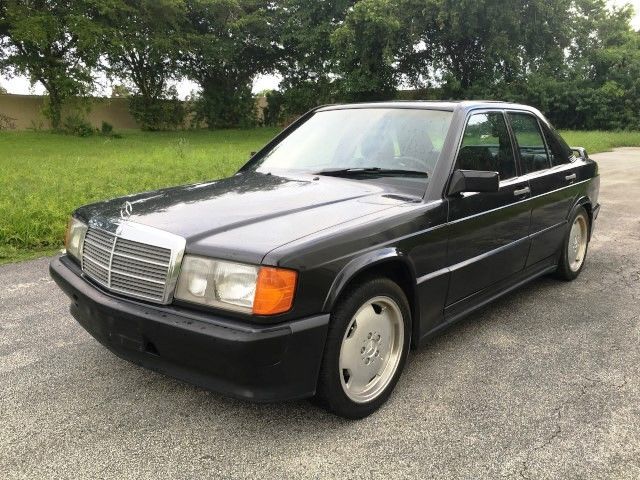1986 Mercedes Benz 190E 2.3-16 NO RESERVE
1986 Mercedes-Benz Other 4dr Sedan 19
Mercedes-Benz Other 1986 technical specifications | |
|---|---|
| Condition: | Used |
| Item location: | West Palm Beach, Florida, United States |
| Make: | Mercedes-Benz |
| Model: | Other |
| SubModel: | 4dr Sedan 19 |
| Type: | Sedan |
| Year: | 1986 |
| Mileage: | 86,450 |
| VIN: | WDBDA34D7GF148701 |
| Color: | Black |
| Number of cylinders: | 4 |
| Fuel: | Gasoline |
| Transmission: | Manual |
| Interior color: | Black |
| Vehicle Title: | Clear |
| You are interested? | Contact the seller! |
Description |
|---|
1986 MERCEDES BENZ
COSWORTH
190E 2.3-16
Transmission: 5 speed (dog leg)
Great driver, recently serviced, paint is very nice, interior leather seat does have the usual flaws (see pictures).
No rust, strong engine and transmission. Needs AC to be serviced.
Palm Beach Classics can assist with shipping around the world.
Contact us for more information.
FROM WIKIPEDIA:
190 E 2.3-16 and 2.5-16 "Cosworth"
In the late 1970s, Mercedes competed in rallying with the big V8-powered Coupés of the R107 Series, mainly the light-weight Mercedes 450 SLC 5.0. Mercedes wished to take the 190 E rallying, and asked British engineering company Cosworth to develop an engine with 320bhp (239kW) for the rally car. This project was known as project "WAA' by Cosworth".[11] During this time, the Audi Quattro with its all-wheel drive and turbocharger was launched, making the 2.3-16v appear outclassed. With a continued desire to compete in high-profile motor sport with the 190, and also now an engine to do it with, Mercedes turned to the Deutsche Tourenwagen Meisterschaft (DTM) (German Touring Car Championship) motor sport series instead. Cars racing in this championship, however, had to be based on a roadgoing model. Mercedes therefore had to put into series production a 190 fitted with a detuned version of the Cosworthengine. This high-performance model was known as the 190 E 2.3-16, and debuted at the Frankfurt Auto Show in September 1983, after its reputation had already been established. Three cars, only slightly cosmetically altered, had set three world records in August at the Nardo testing facility in Italy, recording a combined average speed of 154.06mph (247.94km/h) over the 50,000km endurance test, and establishing twelve international endurance records. The Mercedes 190-E Cosworth was also featured on the second episode in series fifteen of the popular car show Top Gear.
Engine2.5-16 CosworthThe Cosworth engine was based on the M102 four cylinder 2.3-litre 8-valve 136hp (101kW) unit already fitted to the 190- and E-Class series. Cosworth developed the cylinder head, "applying knowledge we've learnt from the DFV and BDA."[12] It was made from light alloy using Coscast's unique casting process and brought with it dual overhead camshafts and four valves per cylinder, meaning 16 valves total which were developed to be the "largest that could practically be fitted into the combustion chamber".[12]
In roadgoing trim,the 2.3L 16-valve engine made "185hp (138kW) at 6,200 rpm and 174lb·ft (236N·m) at 4,500 rpm. The oversquare 95.50 x 80.25 mm bore and stroke dimensions ensuring that it revs easily up to the 7000 rpm redline".[13] Acceleration from 0–100km/h (62mph) was less than eight seconds, and the top speed was 230km/h (143mph).[13]
US-Specification cars had a slightly reduced compression ratio (9.7:1 instead of 10.5:1), and were rated at 167hp (125kW) @ 5800 rpm and 162lb·ft (220N·m) @ 4750.
The roadgoing version of the engine was reconfigured with reduced inlet and exhaust port sizes, different camshaft profiles, no dry sump configuration and Bosch K-jetronic replacing the specialised Kugelfischer fuel injection. These changes helped bring power down to the required 185bhp (138kW) specification, but still resulted in a "remarkably flexible engine, with a very flat torque curve and a wide power band".[12] The heads for the engines were cast at Cosworth's Coscast foundry in Worcester and sent to Germany to be fitted to the rest of the engine, parts of which were different from the standard 2.3 including light pressed alloy pistons, and rings designed to withstand higher engine speeds, whilst con-rods, bearings and bearing caps were found to be strong enough as standard and left unaltered.[12]

 1986 Mercedes-Benz 190E 2.3-16 Sedan 4-Door 2.3L (Cosworth)
1986 Mercedes-Benz 190E 2.3-16 Sedan 4-Door 2.3L (Cosworth)
 VERY RARE 1986 Mercedes Benz 190E 2.3L 16V EVO II CARLSSON. ONLY 100 made.
VERY RARE 1986 Mercedes Benz 190E 2.3L 16V EVO II CARLSSON. ONLY 100 made.
 1986 Mercedes 190E Automatic 4 Cylinder NO RESERVE
1986 Mercedes 190E Automatic 4 Cylinder NO RESERVE
 1986 Mercedes 190E Evo Reproduction
1986 Mercedes 190E Evo Reproduction
 1986 Mercedes Benz 190e 2.3-16
1986 Mercedes Benz 190e 2.3-16
 1986 Mercedes-Benz 190E/16 VALVE COSWORTH
1986 Mercedes-Benz 190E/16 VALVE COSWORTH
 1986 Mercedes-Benz 190 E 190E 2.3-16 Manual 5-Speed RWD I4 2.3L NO RESERVE
1986 Mercedes-Benz 190 E 190E 2.3-16 Manual 5-Speed RWD I4 2.3L NO RESERVE
 1986 Mercedes-Benz 190E 2.3-16 Sedan 4-Door 2.3L Low Mileage Clean Example !!!
1986 Mercedes-Benz 190E 2.3-16 Sedan 4-Door 2.3L Low Mileage Clean Example !!!